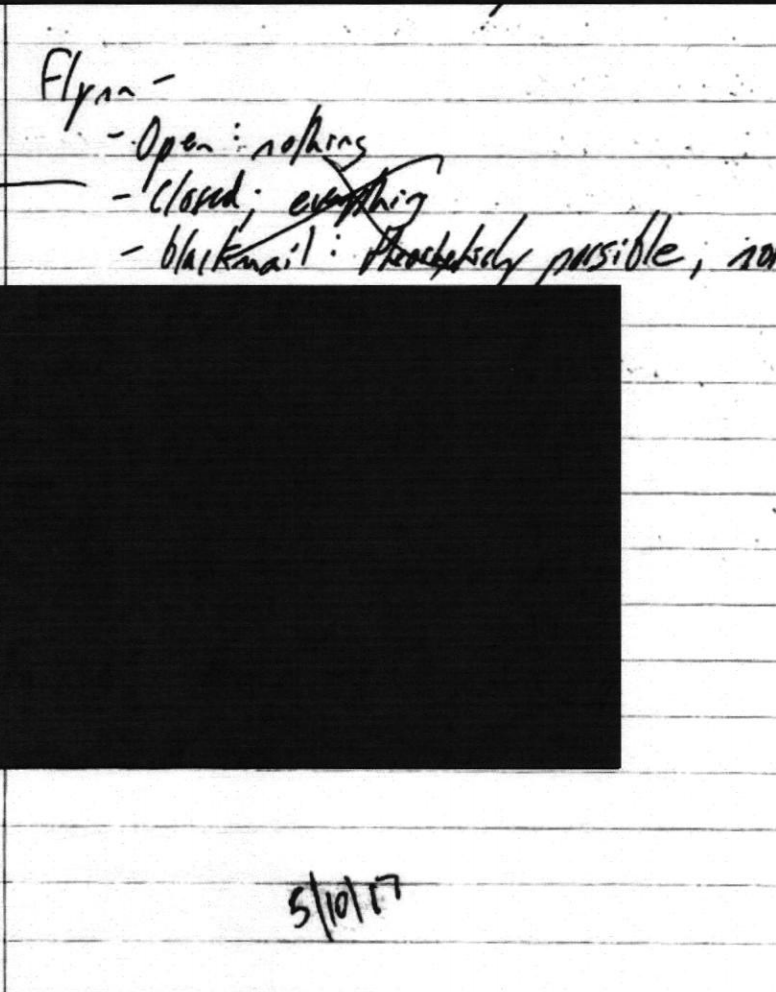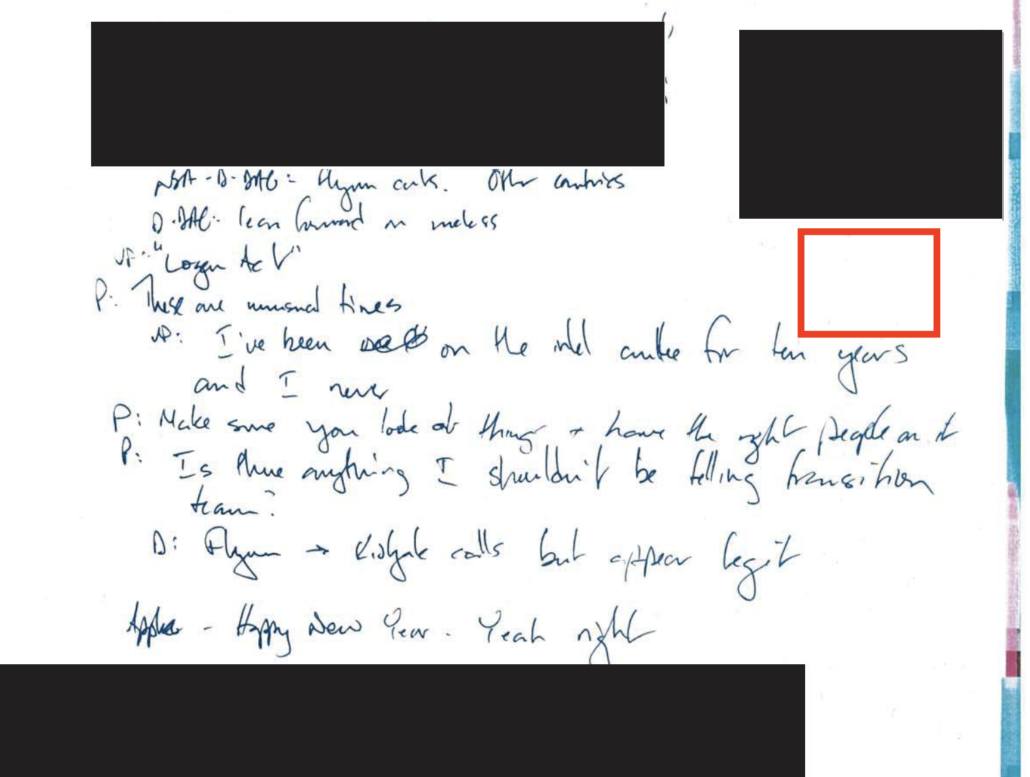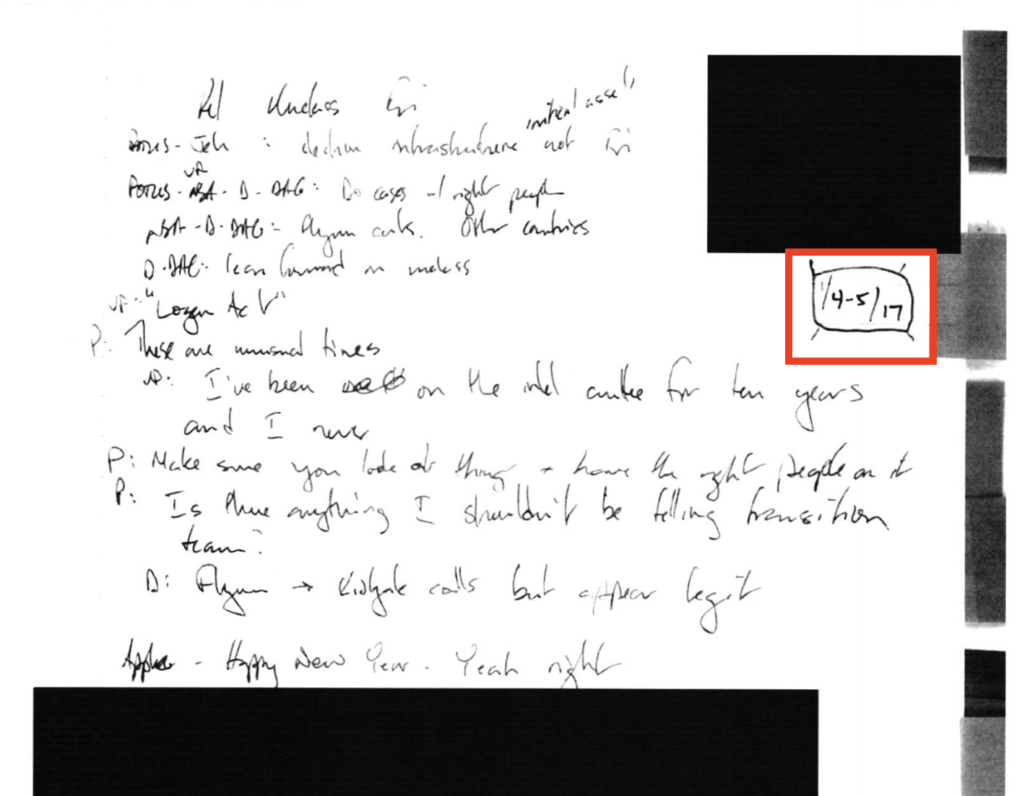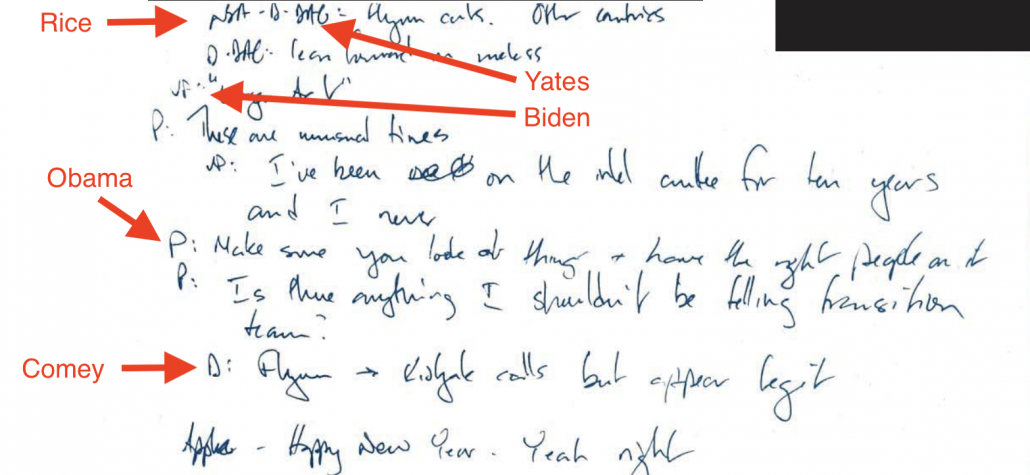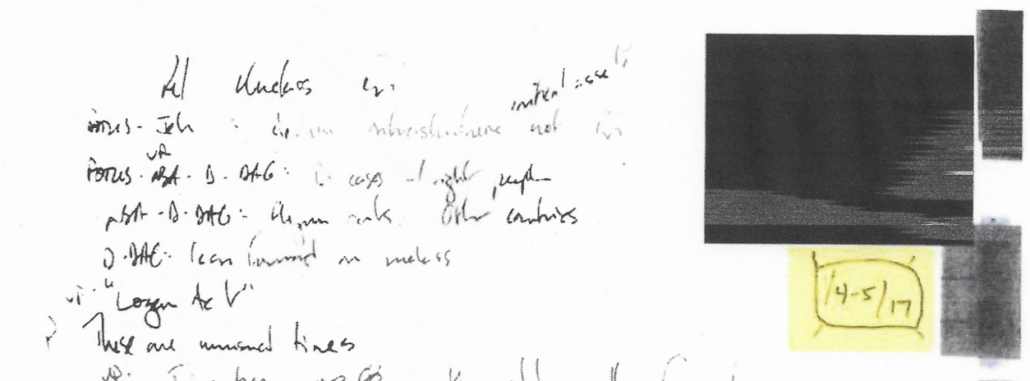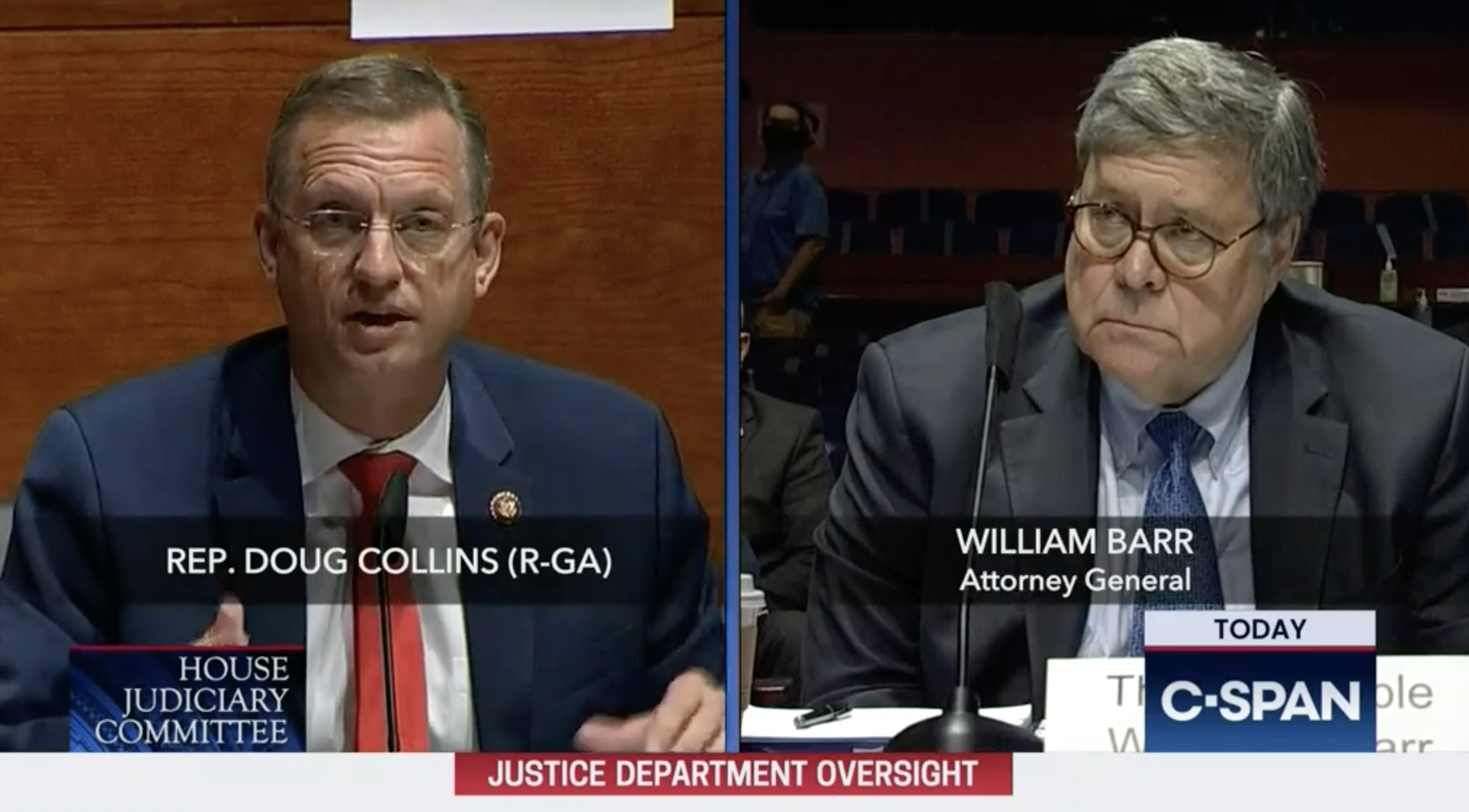Before I explain the most important takeaway from the Mike Flynn hearing, let me note two points.
First, the Department of Justice is quite clear that none of the materials turned over recently to Mike Flynn were Brady material showing exculpatory evidence. DOJ has disclaimed any prosecutorial misconduct in Judge Sullivan’s courtroom. Bill Barr even said as much, under oath, before the House Judiciary Committee. DOJ has falsely claimed they were “new,” but some of the actual details weren’t even new to Flynn, much less new to DOJ, even if some of the documents were. That’s important because a number of the judges today seem to believe that DOJ wants to dismiss this case because they believe there was misconduct.
Nope.
The government disclosed approximately 25 pages of documents in April and May 2020 as the result of an independent review of this case by the United States Attorney for the Eastern District of Missouri. While those documents, along with other recently available information, see, e.g., Doc. 198-6, are relevant to the government’s discretionary decision to dismiss this case, the government’s motion is not based on defendant Flynn’s broad allegations of prosecutorial misconduct. Flynn’s allegations are unfounded and provide no basis for impugning the prosecutors from the D.C. United States Attorney’s Office.
They want to dismiss the case because they don’t believe calling up the country that just attacked us and secretly undermining the punishment on them, then lying about it, is any big thing.
Second, in the second-to-last release to Flynn of materials that aren’t new but that Billy Barr used to invent a reason to dismiss the prosecution, DOJ either betrayed breathtaking ignorance of the investigation into Flynn, or they lied. In turning over notes from Peter Strzok that clearly memorialize a January 5, 2017 meeting that has been the subject of public disclosure going back years (well before Flynn reallocuted his plea deal), DOJ claimed not to know their date.
The enclosed document was obtained and analyzed by USA EDMO during the course of its review. This page of notes was taken by former Deputy Assistant Director Peter Strzok. While the page itself is undated; we believe that the notes were taken in early January 2017, possibly between January 3 and January 5.
That professed uncertainty led the frothy right to claim that Joe Biden suggested Flynn be prosecuted for the Logan Act, which led to FBI reopening the investigation, which led to his prosecution. It was obvious the notes were from January 5, and I’ve since confirmed that. That DOJ claimed not to know the date of these notes is either evidence that they’re using this process to invent campaign dirt, or evidence that all the people reviewing this material have no grasp on the facts.
Which is to say, the judges have the very mistaken impression that DOJ withheld material they should have turned over, and that DOJ itself has suggested (in the less damning reading of their actions) to have no grasp of basic facts about the investigation into Flynn or even basic physics about time. No. Both claims are, at best, reason to further scrutinize this case.
Even ignoring the fact that DOJ has presented two different explanations for why they want to dismiss a case that they, months earlier, argued merited prison time, taking just the original motion to dismiss on its face value (ignoring the obvious lies in it), three months later, no one understands why DOJ moved to dismiss the case.
That’s important, because Acting Solicitor General Jeff Wall claims it would cause irreparable harm to the Executive Branch if DOJ had to answer any questions about why they dismissed the case.
That matters for two reasons. First, as the attorney representing Judge Emmet Sullivan, Beth Wilkinson, pointed out, what distinguishes this case from a Dick Cheney case that SCOTUS has said threatened the prerogatives of the Executive branch, DOJ has already proven willing to offer up reasons for their motion to dismiss, even if they are, partly, transparently false. DOJ is not claiming that they can’t respond to these questions, they’re offering up explanations unasked, and then objecting aggressively when asked question about those claims.
Indeed, Wall offered up a crazy new detail in this hearing: He implied that, in addition to believing that material lies are not the same for Flynn as other people and that secretly calling up the country that just attacked us to say, “no big deal,” is not alarming, there is also non-public information from other investigations that led Billy Barr to tank the Flynn prosecution.
The Attorney General sees this in a context of non-public information from other investigations.
[snip]
I just want to make clear that it may be possible that the Attorney General had before him that he was not able to share with the court and so what we put in front of the court were the reasons that we could, but it may not be the whole picture available to the Executive Branch.
[snip]
It’s just we gave three reasons; one of them was that the interests of justice were not longer served, in the Attorney General’s judgment, by the prosecution. The Attorney General made that decision, or that judgment, on the basis of lots of information, some of it is public and fleshed out in the motion, some of it is not.
[snip]
If all we had to do was show up and stand on our motion, no, we’ve already said that to the District Court.
Billy Barr has a secret. And that, Acting Solicitor General Jeff Wall suggested, is why a mere hearing on this motion to dismiss would irreparably harm DOJ (even while Wall alluded to the information without being asked).
Wow.
The revised explanation why DOJ can’t prosecute Flynn that Flynn prosecutor Jocelyn Ballantine has offered (one in which the Solicitor General’s Office has also participated) is that DOJ can’t “prosecute” Mike Flynn because DOJ has collected so much impeaching evidence against those who investigated Flynn that they can’t prove the case he has twice pled guilty to even though witnesses like KT McFarland and Mike Pence support their case.
Furthermore, since the time of the plea, extensive impeaching materials had emerged about key witnesses the government would need to prove its case. Strzok was fired from the FBI, in part because his text messages with Page revealed political bias against the current administration and “implie[d] a willingness to take official action to impact the presidential candidate’s electoral prospects.” U.S. Dep’t of Justice, Office of the Inspector General, A Review of Various Actions by the Federal Bureau of Investigation and Department of Justice in Advance of the 2016 Election xii (December 2018). The second interviewing agent has been accused of acting improperly in connection with the broader investigation. McCabe, who authorized Flynn’s interview without notifying either the Department of Justice or the White House Counsel, was fired for conduct that included lying to the FBI and lying under oath. U.S. Dep’t of Justice, Office of the Inspector General, A Report of Investigation of Certain Allegations Relating to Former FBI Deputy Director Andrew McCabe 2 (February 2018). In addition, significant witnesses have pending investigations or lawsuits against the Department of Justice, which could create further questions about their testimony at trial. See Strzok v. Barr, Civ. No. 19-2367 (D.D.C. Aug. 6, 2019); McCabe v. Barr, Civ. No. 19-2399 (D.D.C. Aug. 8, 2019); Page v. Dep’t of Justice, Civ. No. 19-3675 (D.D.C. Dec. 10, 2019). Those developments further support the government’s assessment about the difficulty it would have in proving its case to a jury beyond a reasonable doubt.
That is, Ballantine says DOJ can’t sentence Flynn for his admitted crimes because they’ve also laid out how DOJ has trumped up investigations against all the people who investigated Flynn, and at least three of those people have credible legal claims against DOJ for those trumped up investigations.
That suggests one of several things.
It’s possible the secret Billy Barr doesn’t want to reveal deals with how 30-year intelligence veteran Mike Flynn sold his services to the government of Turkey while working for Trump, while trying to hide that fact, all without knowing why that’d be a problem. DOJ has not yet backed off the facts Flynn gave the grand jury (another basis for perjury charges against him, in addition to his plea allocutions, which the Circuit judges appeared to miss), and indeed has doubled down on the Bijan Kian investigation. So maybe DOJ is claiming that poor Mike Flynn was compromised by his non-professional partner out of naiveté?
Another possibility is that there are other secret investigations ongoing, whereby poor 30-year defense intelligence veteran General Flynn was targeted by Russian intelligence but was helpless to rebuff their entreaties and so must be forgiven for lying about all that.
A third possibility is that DOJ has been ordered by the President to make sure none of the people who protected him do prison time. Secret reason. Can’t be shared with judges. Checks out!
The most likely secret information Billy Barr is hiding — particularly given Wall’s reference to other investigations — is the Durham investigation, the possibility that John Durham will find something in his investigation into Trump’s people where DOJ IG found nothing. That means either that Billy Barr took actions in May that John Durham has not charged in the interim three months. Or, that Billy Barr is trying to pre-empt Flynn’s prosecution believing — or expecting — that an investigation that has not yet completed will end up in criminal charges.
If that’s what’s happening, it would suggest that Barr has already decided what the outcome of the Durham investigation will be, prejudging its outcome and effectively neutering Durham, making his prosecutorial decision an afterthought.
Which is why I focused on DOJ’s false claim — possibly attributed to Jeffrey Jensen, the US Attorney Billy Barr directed to find reasons to blow up the Flynn prosecution while Durham continued to work — that Joe Biden raised the Logan Act before the FBI (and ODNI) raised it themselves. In that case, at least, Barr’s selected flunkies have proven themselves to either be willing to misrepresent evidence or to be painfully stupid about it. In that case, a US Attorney deputized into Billy Barr’s projects has admitted to either knowing fuckall or inventing facts for political purpose. That, by itself, raises questions about the presumption of regularity that Barr might otherwise be afforded.
DOJ claims they’ve given abundant reason why they wanted to dismiss the prosecution against Flynn, even though their reasons conflict with all precedent and the record that Bill Barr’s DOJ has established in this case.
But today we learned there’s another, secret, reason why Billy Barr wanted to dismiss the case against Flynn. Even while DOJ has made it clear they are either misrepresenting the record or unfamiliar with it.
Which is all the more reason why Judge Sullivan should have a hearing, and which likely explains why DOJ has claimed, multiple times now, that that would do irreparable harm to DOJ.
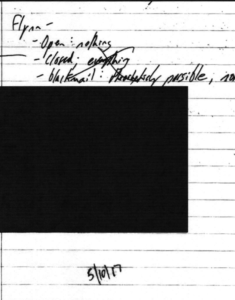 In my coverage of the way DOJ has added dates to undated notes, I’ve always said that I have no reason to believe that the date DOJ added to Andrew McCabe’s notes was erroneous.
In my coverage of the way DOJ has added dates to undated notes, I’ve always said that I have no reason to believe that the date DOJ added to Andrew McCabe’s notes was erroneous.
